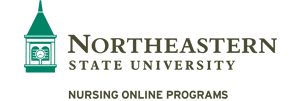Although earning a Bachelor of Science in Nursing (BSN) is an excellent way to expand your knowledge and gain additional employment opportunities, the process also serves as a necessary stepping stone for nurses interested in eventually attending graduate school. The online RN to BSN program at Northeastern State University (NSU) assists diploma- and associate-prepared nurses in creating a pathway to higher education and cultivating an interest in lifelong learning and ongoing professional development.
How Does an RN to BSN Prepare Nurses for Grad School?
While the potential for an increased salary or career advancement motivates many to pursue a BSN, the degree is required for nurses who are interested in studying at the graduate level. An RN to BSN program builds upon previous professional experiences and education and delves deeper into nursing theory, cultural competencies and research and leadership practices. It provides the foundational knowledge and skills necessary for success in a range of healthcare settings and roles including preparing nurses for master’s and doctoral studies by:
Establishing a diverse skill set. BSN programs help nurses strengthen their research and investigative abilities, problem-solving and critical-thinking skills, and study habits. As patient care practices become increasingly complex and specialized, these skills serve nurses well, both during their career and throughout any further educational endeavors.
Meeting accreditation standards. While a prerequisite for entry to graduate school, BSN degrees are typically only accepted if they were earned through an accredited university and grades were issued using a GPA scale. The NSU RN to BSN program meets both requirements with accreditation provided by the Accreditation Commission for Education in Nursing (ACEN).
Generating a desire for lifelong learning. Nurses who are committed to lifelong learning and ongoing personal and professional development will be prepared to quickly acclimate to any changes in the workplace or challenges encountered during graduate school. This desire to continuously learn and improve is cultivated throughout a BSN program and allows nurses to grow their knowledge base, advance their careers, and positively impact patient care, outcomes and the overall healthcare landscape.
Why Is Lifelong Learning Important?
Modern day nursing is drastically different than nursing just 20 years ago, and it continues to evolve at a rapid pace. As new evidence-based practices and technological advances emerge, nurses must be able to interpret those changes, adapt their methodology, and implement the updated guidelines and protocols. Nurses who are open to continuous learning are likely to navigate these transitions more smoothly.
According to the 2010 Future of Nursing report by the Institute of Medicine (IOM), which changed its name to the National Academy of Medicine (NAM) in 2015, all nurses should commit to lifelong learning and strive to expand their knowledge base and skill sets. By doing so, nurses will be better prepared to meet the demands of an increasingly diverse, chronically ill and aging population.
To facilitate the learning process, the IOM suggests that nurses earn a bachelor’s degree within five years of completing a diploma or associate program. The Institute also recommends that at least 10 percent of BSN-prepared nurses go on to pursue graduate degrees in order to help fill vacant postsecondary educator positions and to generate qualified candidates for research, leadership and advanced practice nursing roles.
Ready for Grad School
While the initial drive for completing an RN to BSN program is often to secure better pay and enhance career prospects, the degree offers the added benefit of preparing you for graduate school. Between improving critical-thinking skills, encouraging lifelong learning and expanding the depth of knowledge related to professional nursing, RN to BSN programs prepare graduates to face the changing dynamics of patient care as well as to enter master’s and doctoral programs.
Learn more about the NSU online RN to BSN program.
Sources:


